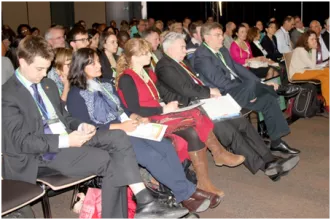Restoring landscapes through climate-smart agriculture
21 December 2015
As world leaders gathered in 2015 to agree on Sustainable Development Goals and a new climate deal, the Global Landscapes Forum used this historic opportunity to bring together more than 3,000 stakeholders from forestry, agriculture, water, energy, law and finance, among others, with the aim of shaping the world’s development agenda for decades to come. For the first time, the Association of International Research and Development Centers for Agriculture (AIRCA) participated in this event as an Implementing Partner, and organized a discussion forum with the title “Restoring Landscapes through Climate Smart Agriculture”.
Dr. Dyno Keatinge, AIRCA Chair and DG AVRDC; Dr. Ismahane Elouafi, Deputy Chair AIRCA and DG ICBA; Dr. Trevor Nicholls, CEO CABI; Dr. José Joaquín Campos, DG CATIE; Dr. Hans Friederich, DG INBAR and Dr. Eklabya Sharma, Director of Programme Operations ICIMOD presented examples of how AIRCA members have developed different aspects of climate-smart agriculture (CSA) and how this has contributed to healthy landscapes and improved livelihoods in Africa, Asia and Latin America.
All agreed that climate-smart agriculture is an essential component of rural landscapes, aiming at sustainable rural development under changing conditions and low carbon emissions. The two approaches (CSA and landscapes) complement each other where the landscape approaches proposed are helping to create the enabling conditions for CSA implementation. Success and out-scaling of these approaches, however, depends on the degree to which collective intelligence is being identified, applied, and linked to appropriate technologies. This poses many challenges and it requires collaborative partnerships to address all the challenges.
The combination of centers involved in the AIRCA initiative ensures a combined expertise that addresses directly at least 10 of the 17 SDGs, allowing for a holistic approach to rural development, aiming at food security under changing conditions and lowering carbon emissions while seeking inclusiveness, maintaining life on lands, reduced poverty, access to clean water and sanitation, decent work and economic growth, clean energy and responsible production and consumption.
Recommendations made during the session include the need to work inter-sectorally, inter-institutionally and in partnerships that support CSA. Any strategies or approaches taken should be affordable and replicable as well as acceptable by people, looking for the balance between development, mitigation and adaptation. Agricultural diversification is an essential element of sustainable, healthy landscapes and for this to be achieved cooperation is vital with the education sector, consumers and other sectors of the economy. Policies and strategies should be talking about healthy lifestyles while supporting farmers to meet a diversified demand for food.
Furthermore, although a lot is known already for the implementation of CSA and landscapes approaches, successful implementation requires local adjustments that make them affordable and effective under local conditions, as well as a good understanding of the mechanisms for decisions and the analysis of the consequences of these decisions for future livelihoods.
AIRCA members also organized and participated in a number of other events around the GLF and COP21, for example the Launch of the Paris Declaration on Agricultural Diversification, and the Regional Declaration to promote Climate Smart Agriculture in Latin America.
Dr. Dyno Keatinge, AIRCA Chair and DG AVRDC; Dr. Ismahane Elouafi, Deputy Chair AIRCA and DG ICBA; Dr. Trevor Nicholls, CEO CABI; Dr. José Joaquín Campos, DG CATIE; Dr. Hans Friederich, DG INBAR and Dr. Eklabya Sharma, Director of Programme Operations ICIMOD presented examples of how AIRCA members have developed different aspects of climate-smart agriculture (CSA) and how this has contributed to healthy landscapes and improved livelihoods in Africa, Asia and Latin America.
All agreed that climate-smart agriculture is an essential component of rural landscapes, aiming at sustainable rural development under changing conditions and low carbon emissions. The two approaches (CSA and landscapes) complement each other where the landscape approaches proposed are helping to create the enabling conditions for CSA implementation. Success and out-scaling of these approaches, however, depends on the degree to which collective intelligence is being identified, applied, and linked to appropriate technologies. This poses many challenges and it requires collaborative partnerships to address all the challenges.
The combination of centers involved in the AIRCA initiative ensures a combined expertise that addresses directly at least 10 of the 17 SDGs, allowing for a holistic approach to rural development, aiming at food security under changing conditions and lowering carbon emissions while seeking inclusiveness, maintaining life on lands, reduced poverty, access to clean water and sanitation, decent work and economic growth, clean energy and responsible production and consumption.
Recommendations made during the session include the need to work inter-sectorally, inter-institutionally and in partnerships that support CSA. Any strategies or approaches taken should be affordable and replicable as well as acceptable by people, looking for the balance between development, mitigation and adaptation. Agricultural diversification is an essential element of sustainable, healthy landscapes and for this to be achieved cooperation is vital with the education sector, consumers and other sectors of the economy. Policies and strategies should be talking about healthy lifestyles while supporting farmers to meet a diversified demand for food.
Furthermore, although a lot is known already for the implementation of CSA and landscapes approaches, successful implementation requires local adjustments that make them affordable and effective under local conditions, as well as a good understanding of the mechanisms for decisions and the analysis of the consequences of these decisions for future livelihoods.
AIRCA members also organized and participated in a number of other events around the GLF and COP21, for example the Launch of the Paris Declaration on Agricultural Diversification, and the Regional Declaration to promote Climate Smart Agriculture in Latin America.
